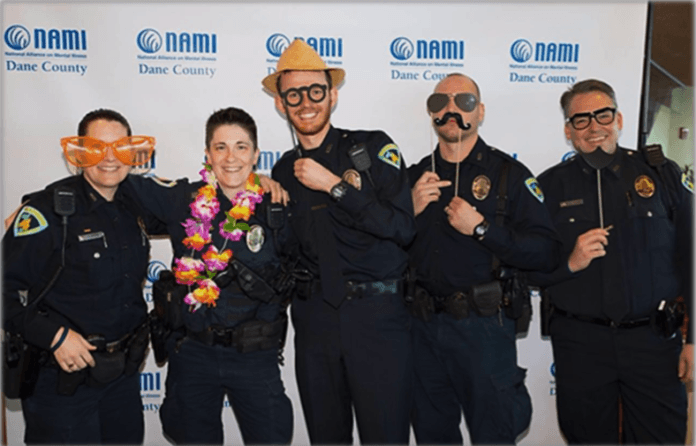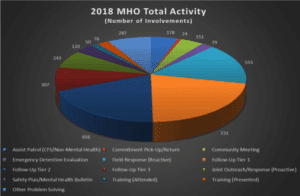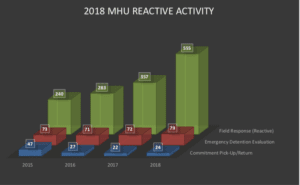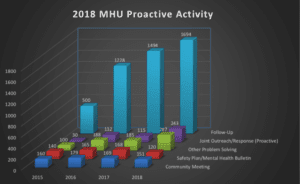Chief Koval’s blog today has the 2018 report on Mental Health (Police) Officers. So I took a look. (Before you yell at me for that photo, that photo was in their report.)
Mental Health Police Staffing and Training
Both Koval’s blog and the report tell us that this is the amount of police resources we are putting into this public health issue.
- 1 captain
- 1 sergeant
- 3 embedded mental health crisis workers
- 6 Mental health officers
- 40 Mental Health Liaison Officers. In 2018, the MHLs received one full eight-hour day of training. New this year, the MHO Sergeant created a Mental Health Liaison Steering Committee comprised of volunteer MHLs representing all patrol shifts to help govern this group. In 2018, owing to significant strains on staffing MHLs were only able to attend one, eight-hour Mental Health Liaison training, rather than the four they had attended in 2017.
- All officers receive “comprehensive mental health/crisis intervention training” in pre-service academy and subsequent department in-services. Training includes an overview of major mental illnesses provided by local psychiatrists, scenario-based de-escalation training, emergency detention processes, consumer panel discussions, interagency collaboration, and community resource options.
I count 11 dedicated staff and 40 with minimal additional training.
How many mental health calls get a specialized officer?
There is a common misperception that if you call the Madison Police you can request a mental health officer and they will just show up. That isn’t true. I hope you never have to try it and face this overwhelming disappointment and fear when you realize you called the police expecting a mental health officer but you are not going to get one. Again, I cannot stress this enough. Just because you call the police and ask for a mental health officer, doesn’t mean you will get one. In fact, you are highly unlikely to get one.
Here’s the numbers. In 2018
- 45,702 distinct cases investigated by MPD
- 4,571 or 10% were mental health-related
-
MHOs [mental health officers] responded to active mental health calls 555 times
By my calculations
- 4,016 of the 4,571 mental health calls did not have a mental health officer that responded
- in other words, 88% of the mental health calls don’t get a mental health officer
- One more time – only 555 or 12% of calls for service for mental health issues get a mental health officer
What do these Mental Health Officers spend their time doing?
11 full time staff and this is what the report says they spend their time doing (some of the colors in the pie chart are hard to distinguish and not mentioned in the narrative, but here is what I can figure out:
731 – Follow up Tier 1 activities – Any emails, phone calls, etc. related to a CFS or individual that are under 10 minutes (CFS = Call for service? They never say in the report but that is my educated guess)
656 – Follow up Tier 2 activities – Case history review for an individual or mental health issue, multiple emails and/or phone calls on the same individual or issue, or other follow- up longer than 10 minutes
555 – Field response (reactive) – Responding to an active call for service and/or fielding a phone call from patrol on an active call for service that is mental health related
307 – Follow-Up Tier 3 – A field response related to a CFS (not currently being worked by patrol) or individual, including systems or care team meetings
287 – Other problem-solving initiatives (345 hours) – Other problem solving efforts involving a mental health component
243 – Joint Outreach/Response (Proactive) Outreach by MHO in conjunction with Crisis/Case Management/Other Providers regarding a concluded call for service, or self-initiated outreach following referrals from Crisis/Case Management/Provider
178 – Assist Patrol (CFS/Non-Mental Health) Any CFS that assists patrol and is non- mental health related
151 – Community Meeting – Any community meeting that does not involve a training aspect
120 – Safety Plan/Mental Health Bulletin – Development or update of a safety plan or mental health bulletin
79 – Emergency Detention Evaluation – Call for service or evaluation process for an emergency detention (regardless of disposition)
76 – Training Pressented
50 – Attending Training
24 – Commitment Pick-up/return
0?? – Diversion from patrol (This number is not in the pie chart? And the phrase doesn’t appear elsewhere in the report)
0?? – Jail Diversion – Mental health call that could have resulted in a citation or arrest but did not (This number is not in the pie chart? This phrase only appears once in the report where the Crisis Worker attended a workshop)
Not in the pie chart, but in the narrative
- Accompanied Journey Mental Health workers on 189 home visits.
- In addition, our embedded Crisis Workers conducted even more home visits with other MPD officers, including the MHLs.
- Spent over 346.75 hours reviewing mental health-related police reports.
This is a year-by-year comparison.
Reports like this usually have a budget request!
And here it is (page 11):
Given the highly specialized nature of our unit’s work in an ever-changing environment regarding mental health, frequent training is essential to ensure the safety andprofessionalism not only of our unit, but of MPD’s response to mental health-related crises as a whole. Specific training needs include sending MHOs to advanced CIT, threat assessment and advanced interviewing courses.
The Mental Health Team acquired two detective-style vehicles this year through a COPS grant. This was a welcome and appreciated upgrade, but insufficient for a 10 person unit. Ideally, the MHU would be equipped with two unmarked patrol squads, as well as five unmarked, detective-style cars equipped with MDC capabilities. The unmarked patrol squads would allow MHOs to transport subjects securely. We would propose adding cars incrementally, starting with two additional detective-style cars in 2019.
Additionally, all MHOs could benefit greatly from the issuance of city laptops, given the highly mobile nature of our work and the intensive investigation and documentation required through various computing programs, including LERMS, NCIC, Spillman, Accurint, CLEAR, etc. As of now, two MHOs have been provided with laptops as a result of regularly-scheduled city IT upgrades and a third is in the process of being acquired for the Midtown MHO.
An alternative budget request
Stop funding the police department to do social work. Fund 8 additional social workers to work with police as needed. Train social workers be first responders instead of police when the situation calls for it. Police have lots of special training to do highly specialized police work. Likewise, social workers have lots of special training to do highly specialized social work. Use the professionals with the proper skills for the right jobs. And when needed, have them work together, but don’t train cops to do social work. Train social workers to be first responders. I know several bad-ass social workers that would be up for the challenge if paid appropriately.











